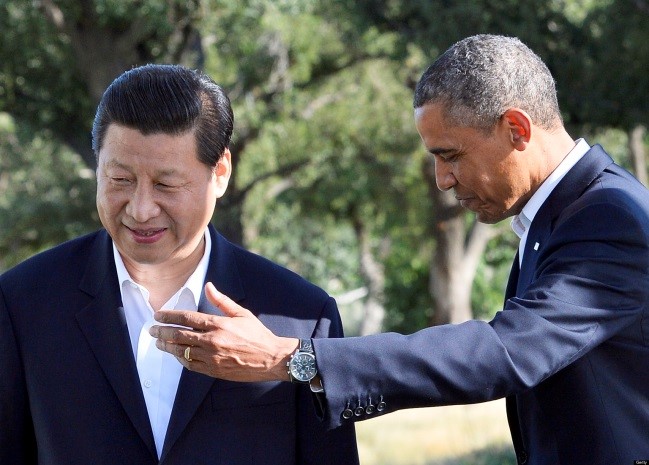 On the last leg of his four nation tour, Xi Jinping visited the US on 7-8 June 2013. The visit is important as it comes just three months after his ascent to presidency. China has reiterated that it attaches great significance to its relations with its neighbours and the United States.
On the last leg of his four nation tour, Xi Jinping visited the US on 7-8 June 2013. The visit is important as it comes just three months after his ascent to presidency. China has reiterated that it attaches great significance to its relations with its neighbours and the United States.
At the outset of the meeting; Xi stated "Today I meet here with President Obama to map out a blueprint for the development of China-U.S. relations and conduct cooperation across the Pacific Ocean." Soon after assuming power both Xi Jinping and Li Keqiang have toured many countries in South Asia and Europe; this indicates China’s intention to begin operating more like a traditional big power. Perhaps it was a first step to redefine the world’s most important bilateral relationship. The summit raises a few questions; what was the agenda of the visit? What does this indicate about the future of the China-US bilateral relations?
Agenda of the Visit
The summit can be best viewed under the US ‘pivot to the Asia-Pacific’ canvas. It was considered that the strategic pivot is to contain China in the region. Xi reflected on this by saying, "The vast Pacific Ocean has enough space" for both countries. The statement hints at the Chinese concern about the US ‘pivot’ in the region, which is already creating a trust deficit in China –US relations. Amid the growing strategic mistrust the two leaders agreed to talk in an informal environment.
During the summit Xi put forward a four-point proposal for building a new type of relations between the two countries. He further elaborated on the concept of ‘new type relations between the two nations in three phrases -- "no conflict and no confrontation," "mutual respect" and "cooperation toward win-win results. Ultimately a consensus was reached wherein both sides will jointly strive to build a new type of great powers relationship between China and the US, with mutual respect, co-operation and win-win. This can be seen as the first acceptance by the US of China’s status as a major power in global politics.
Most importantly, the two countries agreed to use international protocols to reduce the use of hydro fluorocarbon (HFC).For the first time the two countries will team up along with other countries to use the expertise and institutions of the Montreal Protocol to reduce the consumption and production of HFC along with other forms of multilateral cooperation. Until now China had maintained the stance that any cut on the emissions would affect its industrialisation process.
In the context of economic agreements the two leaders agreed to maintain cooperation under the G20 and APEC. They agreed to put forth the functions of existing mechanisms such as the China-U.S. Strategic and Economic Dialogue, China-U.S. Joint Commission on Commerce and Trade, and the China-U.S. Governors Forum to enhance policy coordination and pragmatic cooperation.
The most pressing issues of contemporary times: cyber attacks, maritime disputes in the East and South China Sea and the denuclearisation of the Korean peninsula were flagged without reaching any agreement. The issue of cyber security was discussed at length between the two leaders with Obama making it clear to his Chinese counterpart that if attacks and theft of intellectual property continue, it will be very difficult to maintain economic relations between the two countries. The differences over cyber espionage were apparent even in public statements as Obama stressed on the word theft and used it five times to stress on the fact that China’s activities that have hit US businesses are different from its own domestic counter terrorism surveillance. But no agreement was signed in this regard. Xi did, however, maintain China’s stance on the East and South China Sea and emphasised that China was determined to safeguard national sovereignty and territorial integrity while adhering to solving relevant issues through dialogue. But again the details of the nature of the dialogue were not specified. On the issue of North Korea both leaders agreed on the need for denuclearisation. But there was no assurance from China that they would pressurise the Kim regime on the issue.
China-US Relations in Contemporary Times
China-US relations are underpinned by interdependent economic and political ties on a range of regional and global issues. From being allies of convenience in the second half of the Cold War, the US and China are emerging as partners. The US depends on Chinese trade surplus and savings while Beijing relies on its huge exports to the US to sustain its economic growth. US trade with China is expected to hit USD 450 in 2013; it is expected to replace EU as China’s largest trading partner.
The visit did not achieve much; still it is a significant move to open up an overall diplomatic strategy under the new leadership. Qin Gang, the spokesperson of the Ministry of Foreign Affairs of China, emphasised that “this meeting is important to the long term, sound and steady development of China-US relations as well as regional and international peace, stability and prosperity”. The visit has put bilateral relations on a more solid footing and has set the platform for the China-US strategic and economic dialogue to be held next month.
Courtesy : Institute of Peace and Conflict Studies (http://www.ipcs.org)